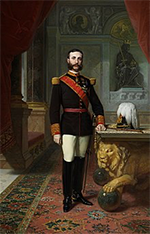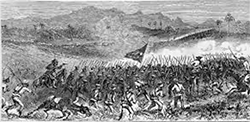King Alfonso XII of Spain
Alfonso XII was King of Spain for 11 years in the late 19th Century. His reign was relatively peaceful, unlike that of his mother. He was born on Nov. 28, 1857, at the Royal Palace, in Madrid. His mother was the reigning monarch, Queen Isabella II, whose father was King Consort Francisco de Asís. Alfonso was born at a time of great uncertainty. In all, supporters of his mother fought three wars against her uncle, Carlos. The queen's forces won all three of the Carlist Wars, but they did consume a great amount of time and energy (not to mention royal revenues), and thousands of people died. As well, a handful of military coups forced the queen's hand in terms of naming royal advisors. 
As the heir apparent, Alfonso was in prime position to take the throne when his mother abdicated, in the Revolution of 1868. However, he was just 11 and so went with his parents, to Paris. A a constitutional government managed the affairs of Spain in the queen's absence; during this time, Alfonso went to Vienna to study at the Theresianum, a well-known private boarding school. He learned much about different cultures throughout Europe and then underwent training at the Royal Military College in England. In the meantime, the powerful nobles running Spain chose a new ruler, an Italian prince, Amadeo of Savoy, a son of Victor Emmanuel II of Italy. The reign of Amadeo I was two years, succeeded in earnest by the declaration of the First Spanish Republic. Even that failed to take hold (after a series of five presidents and two prime ministers, all who served only a short time), and another general, Arsenio Martínez Campos, led yet another coup, in December 1874. This one brought about what historians of this period call the Bourbon Restoration. Alfonso returned to Spain, claiming the throne for himself, as his mother's heir. Many historians date his reign to this return, on Dec. 29, 1874. 
Alfonso instituted a system of governmental succession whereby the two leading political groups would effectively share power, with the leader of one succeeding the leader of the other. As well, Alfonso's great-uncle Carlos had finally left the country. The new king inherited and kept a country in relative calm. A new constitution in 1876 cemented his role as a constitutional monarch. 
In the Caribbean, Cuba sought its independence multiple times, the first coming in 1868. The conflict dragged on for ten years (giving the name to the struggle, the Ten Years' War). Those in rebellion had a manifesto and a constitutional assembly and other trappings of an independent nation, but divisions in both the military and the political apparatus stalled the momentum that the rebel forces had enjoyed. The Pact of Zanjón ended the hostilities without resolving much else. Spain certainly did not recognize an independent Cuba. Simmering resentment on the island led to a renewal of hostilities a year later, in 1879. Spain was emphatic in a victory in the Little War, ending the fighting triumphantly in 1880. Like many monarchs before him, Alfonso wanted to secure a peaceful succession, especially given his experience growing up seeing his mother struggle to justify her ascension. Alfonso married Prince Maria de las Mercedes in January 1878. She died of typhoid fever just a few Queen Maria Christina was pregnant when her husband died, and she gave birth to their son on May 17, 1886. She served as regent as his life began. He was, however, King Alfonso XIII from the moment he was born.
|
|
Social Studies for Kids
copyright 2002–2026
David White



 months later. He married again, the following November, to Archduchess Maria Christina of Austria. The couple had three children: Maria de las Mercedes (1880), Maria Teresa (1882), and Alfonso (1886). The king did not live to see the birth of his son, however, succumbing to a combination of tuberculosis and dysentery, on Nov. 25, 1885. He was 27.
months later. He married again, the following November, to Archduchess Maria Christina of Austria. The couple had three children: Maria de las Mercedes (1880), Maria Teresa (1882), and Alfonso (1886). The king did not live to see the birth of his son, however, succumbing to a combination of tuberculosis and dysentery, on Nov. 25, 1885. He was 27.
